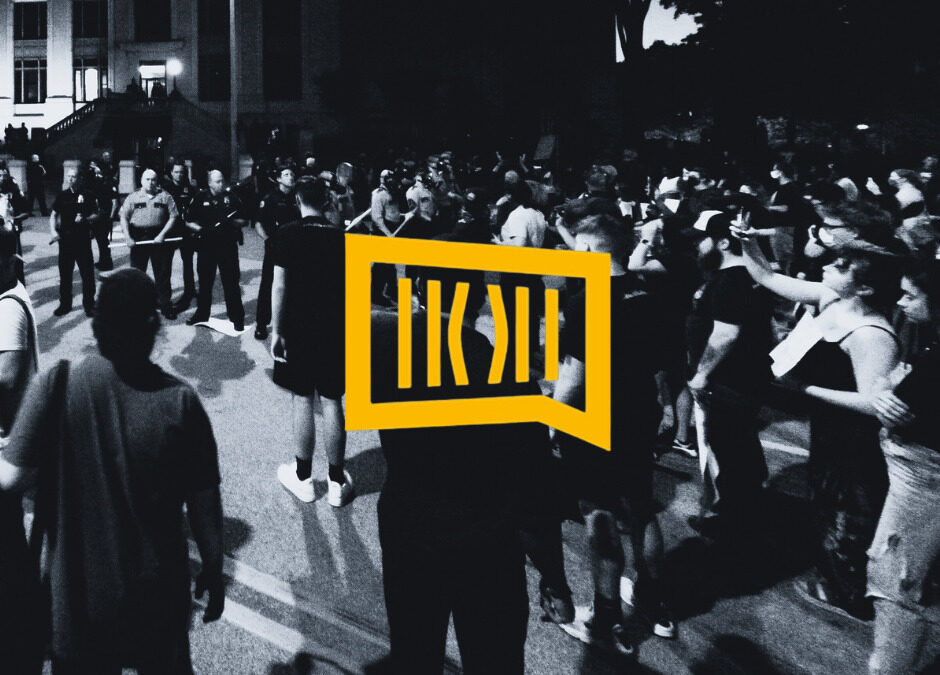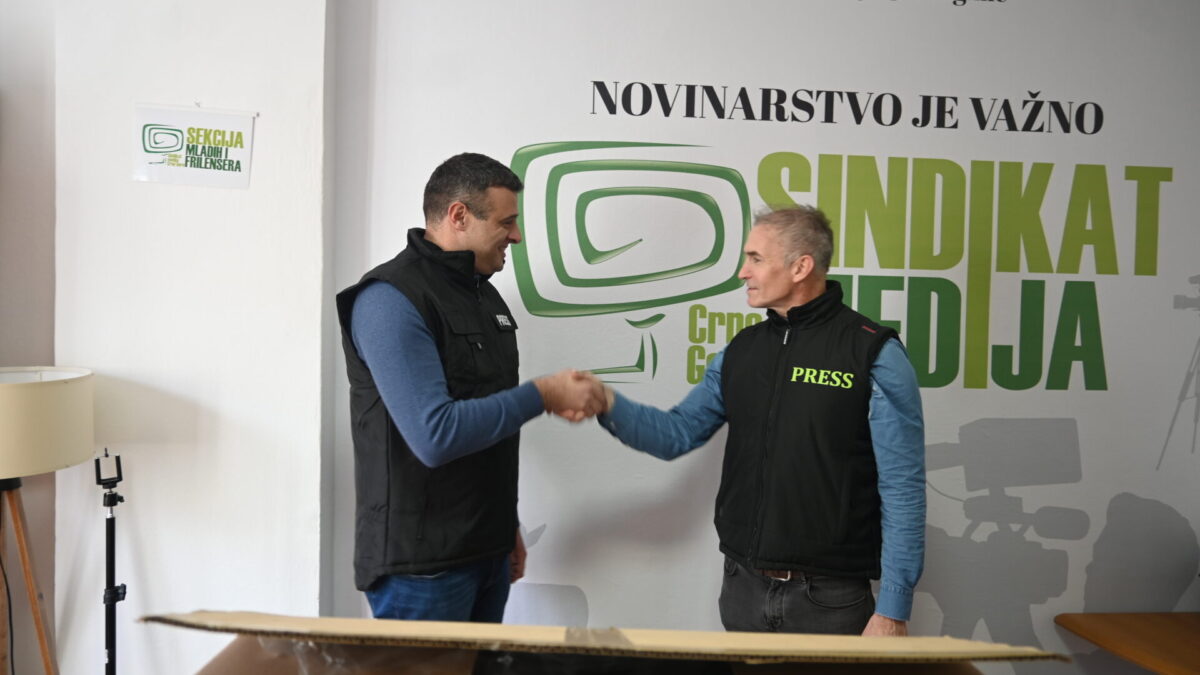
Journalism Under Attack: An Age of Repression and Resistance
The SafeJournalists Network organized a three-day regional conference titled “Journalism Under Attack: An Era of Repression and Professional Resilience” from September 29 to October 1 at Hotel M in Belgrade. On Monday evening, the documentary “Slapping in the Name of the People” by author Jelena Zorić was screened, and the conference was officially opened on Tuesday.
Tamara Filipović Stevanović, Secretary General of the Independent Journalists’ Association of Serbia (IJAS/NUNS), officially opened the conference . Welcoming remarks were also delivered by Janos Babity, Head of the Council of Europe Office in Belgrade; Andreas von Beckerath, Ambassador of the EU Delegation in Serbia; Soufiane Adjali, UN Serbia Resident Representative ad interim and Richard Kohli, Head of Cooperation at the Embassy of Switzerland in Serbia.

foto: Zoran Mrđa/SafeJournalists
Following the opening remarks, Snežana Trpevska, lead researcher of the SafeJournalists Network and the RESIS Institute, presented a regional overview of the Journalists’ Safety Index in the Western Balkans. Neda Čalovska, an expert in women’s rights and policies, spoke about the safety of women journalists in the Western Balkans region.
During the presentations, national researchers provided insight into the state of journalists’ safety in each of the Western Balkan countries individually.
On the first day of the conference, four panel discussions were held.
The topic of the first panel was the safety of women journalists in the Western Balkans. According to data gathered by the SafeJournalists Network, women journalists in the region face various forms of pressure and threats, as well as gender-based violence, which manifests through sexist insults, online hate campaigns, and even physical attacks.

foto: Zoran Mrđa/SafeJournalists
During the panel, several journalists shared their personal experiences, including Bajsola Xama Pandeli (MCN TV), Naile Dema Selmani (journalist and Deputy Chair of the Association of Journalists of Kosovo), Ksenija Pavkov (N1 TV), Lepa Džundeva (TV24), Dragana Šćepanović (Vijesti), Laura Šiprak (24sata), and Nataša Miljanović Zubac (RTRS).
Reem Alsalem, the United Nations Special Rapporteur on Violence Against Women and Girls, also addressed the audience.
The panel was moderated by Getoarbe Mulliqi, Executive Director of the Association of Journalists of Kosovo and a researcher.
She emphasized that the goal of the panel was to identify the challenges faced by women journalists and to explore potential solutions.
The discussion was structured around three main topics: personal experiences and institutional responses, solidarity within the journalistic community, and recommendations for regional and international cooperation. In their opening remarks, the panelists described how both online and offline attacks impact their work, health, and families, as well as the strategies—ranging from therapy and newsroom support to legal action—that help them persevere.

foto: Zoran Mrđa/SafeJournalists
Investigative journalist Basjola Xama Pandeli (MCN TV, Albania) spoke about coordinated defamation campaigns that followed her exposé on the misuse of public funds in the “Isinoreger” case. Online threats, defamation in national media, and pressure on her family lasted for over a year and a half. Nevertheless, her persistence, she said, contributed to the arrest of the mayor of Tirana—showing that determined investigative journalism can have tangible consequences despite the risks.
Lepa Dzundeva (TV24, North Macedonia) described a wave of misogynistic insults and threats she received after using the country’s constitutional name during an interview. A selectively edited clip, posted on social media, triggered a stream of sexualized comments and intimidation. Although she reported the incident to the journalists’ association, the prosecution cited procedural limitations, and the perpetrator went unpunished—highlighting the weakness of institutional protection.
From Republika Srpska (Bosnia and Herzegovina), Nataša Miljanović Zubac (RTRS) shared her experience of enduring long-standing pressure due to her reporting on organized crime and corruption. She described physical assaults, threats to her family, arson targeting her property, brutal messages on social media, and even an arrest on allegations of revealing state secrets—charges from which she was ultimately cleared. According to her, protection has more often come from personal networks and international organizations than from domestic institutions.
Naile Dema Selmani, Deputy Chair of the Association of Journalists of Kosovo (AJK), pointed out a paradox in Kosovo: although women make up over 65% of the journalism workforce and dominate training programs, they rarely hold leadership positions, limiting their influence over safety policies. In response, the Women Journalists Network was launched. Its first report—based on input from nearly 100 women—documents a broad range of issues, including online harassment, smear campaigns, discrimination, intimidation, and sexual harassment.
From Montenegro, Dragana Šćepanović, a journalist with Vijesti, stated that over 60 articles have been published against her, systematically attacking her integrity and violating professional standards. In smaller communities, she noted, “stigmatization runs deeper”—especially for a divorced woman journalist covering sensitive topics alone. Despite institutional inaction, she has initiated legal proceedings to defend her professional reputation.

foto: Zoran Mrđa/SafeJournalists
Ksenija Pavkov, a reporter for N1 in Serbia, described receiving death threats, threats of sexual violence, and attacks on her family in response to her reporting on corruption and mass protests. She emphasized that attacks on women journalists tend to be more personal and misogynistic, making them harder to counter rationally. Chronic stress, she said, has led many of her colleagues to seek therapy, and in her case, contributed to the diagnosis of an autoimmune disease. Nevertheless, she finds strength in editorial and professional solidarity.
Laura Šiprak (24sata, Croatia) shared that following her reports on the prolonged misuse of public resources, she received death threats, threats of sexual violence, and her private address and photos were made public. The psychological consequences—insomnia and depression—were eased thanks to support from her newsroom and journalists’ associations. Still, she emphasized that intimidation will not stop her work.
A global perspective was provided by Reem Alsalem, United Nations Special Rapporteur on Violence Against Women and Girls. She emphasized that violence against women journalists is gender-specific, and often intersects with politics, religion, ethnicity, or sexual orientation. Effective solutions, she stated, include: disaggregated data collection, criminalization of online harassment, swift investigations and legal protection, sensitization of police and judiciary, digital security training, platform accountability, and greater representation of women in media management.
In her closing remarks, the moderator highlighted the importance of solidarity, accountability, and proactive measures to ensure the safety of women journalists. She stressed that the discussions and recommendations from the panel are not only reflections of individual experiences, but a call to action to strengthen protection both regionally and internationally.
She concluded by acknowledging the resilience, integrity, and courage of women journalists, emphasizing that their work, voices, and safety are of utmost importance, and called on all participants to turn the insights from the panel into concrete measures for the protection of the profession.
Second Panel: Journalists’ Labor Rights in the Shadow of Repression and Media Closures
On this topic, speakers included Maja Sever, President of the European Federation of Journalists, who joined the discussion via video link; Blerjana Bino, expert and researcher for the SafeJournalists Network in Albania; Gorica Bukić, journalist at RTV Unsko-sanski Canton in Bosnia and Herzegovina; and Iliri Pireva, freelance journalist from Kosovo.
The conversation was moderated by Marijana Camović Veličković, Vice President of the Trade Union of Media of Montenegro.

foto: Zoran Mrđa/SafeJournalists
According to data from the SafeJournalists Network, journalists in the Western Balkans face difficult working conditions, including insecure contracts, lack of union protection, and unpaid work. Additionally, political pressure and changes in ownership structures lead to dismissals, while the closure or takeover of media outlets by authorities results in self-censorship and job losses.
During the panel on journalists’ labor rights, Maja Sever, President of the European Federation of Journalists, emphasized that unions have the legal right to negotiate and protect journalists, and that employers are obliged to respond. She warned about precarious contracts and dismissals, and stressed the importance of advocating for professional rights, not just material ones. She pointed to Nordic countries as a model and highlighted the importance of support networks. “Only people who are adequately paid can work responsibly and professionally,” she said, warning that without strong media, disinformation fills the void.
Blerjana Bino warned that Albania’s accelerated EU accession process (closing of chapters by 2027, full membership by 2030) risks turning reforms into a formality. “There is a danger that reforms will become mere box-checking, without real impact on people’s lives,” she said. Working conditions remain insecure: dismissals by text message, shows being canceled, and this summer, police blocked a major TV station without due process. The new draft Criminal Code retains criminal defamation and introduces stricter limitations—even internet memes could be punishable. State-run PR production is pushing out professional journalism, and enrollment in journalism studies is declining. She called for greater EU pressure and regional solidarity.

foto: Zoran Mrđa/SafeJournalists
Journalists Gorica Bukić and Iliri Pireva shared their personal experiences.
Gorica Bukić described experiencing discrimination and abuse following a change in political power. She stated that her dismissal was politically motivated.
“At one point, I was the Executive Director, and when the new Board of Directors came in—illegally—I was verbally told to leave the office,” Bukić said.
Since then, Bukić explained, a legal case has been ongoing against the media outlet where she now works as a documentary program journalist earning minimum wage.
“We’re still in court, and my director called a lawyer and requested that a financial expert determine how much of my salary was withheld so that we could settle,” Bukić explained.
Iliri Pireva expressed gratitude to the SafeJournalists Network for supporting her after she was dismissed from the Klan Kosova newsroom, where she had spoken out about violations of journalists’ labor rights.
She decided to initiate legal action after years of systematic neglect of workers’ rights, especially concerning non-working days for national holidays.
“My problem isn’t with institutions, it’s with the profession itself. Journalists are being treated unprofessionally. This isn’t a problem of just one company. Work is losing its human value. Loyalty and obedience should not be valued more than freedom in journalism,” said Pireva.
“It wasn’t easy for me to speak out. I’m a mother of two children, and the fear of losing my job was real. But I simply couldn’t stay silent any longer. I hope my case will encourage others to speak up and fight for their rights,” the journalist added.
She emphasized that she was not punished for poor journalism, but simply because she called attention to real problems.
Third Panel: State of Freedom of Information in Serbia and the Region
At the panel titled “State of Freedom of Information in Serbia and the Region” participants emphasized that, although mechanisms for proactive transparency have been introduced across the region, institutions in the Western Balkans remain largely closed, frequently ignore both the media and the public, make decisions behind closed doors, and there is a trend of stagnation or even deterioration when it comes to access to information.
Slavoljupka Pavlović, Acting Assistant Secretary General at the Commissioner for Access to Information of Public Importance and Personal Data Protection (Serbia), stated that unfortunately, the region is seeing a decline in this area.
“Generally speaking, the region has made significant progress by introducing legal obligations for the proactive disclosure of information. From a normative standpoint, this is very well regulated, but in practice, we often see deterioration—especially when you consider that 47.65% of complaints [due to institutional silence] were found to be justified. The truth is that in Serbia, and partly in Montenegro, we have a major problem with the abuse of the right to access public information. That is our reality, but despite this, the number of well-founded complaints remains very high,” she stated.
Pavlović particularly highlighted the problematic attitude of public authorities toward journalists’ requests.
“There is a high percentage of silence, meaning complete disregard for media requests, which is absolutely unacceptable. The media, as representatives of the public, are being denied access to sensitive information that is of particular importance precisely to that same public,” she said.
Milena Gvozdenović, Deputy Executive Director of the Center for Democratic Transition, stated that the Government of Montenegro is among the largest in Europe—with a Prime Minister, seven Deputy Prime Ministers, 25 ministries, a Minister without Portfolio, and ministries that can have up to 54 state secretaries.

foto: Zoran Mrđa/SafeJournalists
“There is no strategic approach whatsoever—not even the sheer size of the government has motivated them to establish clear rules of conduct, or at least define the responsibilities of each department. The public has no access to information; decisions are made behind closed doors, often during ‘telephone sessions’—that is, via WhatsApp groups where the Prime Minister, ministers, and other cabinet members formally respond to important issues. Appointments in the security sector have even been made through these WhatsApp groups,” said Gvozdenović.
Amina Izmirlić Ćatović, project coordinator at the NGO “Zašto ne?” (Why Not?), said that in Bosnia and Herzegovina, differences can be observed between state-level and entity-level institutions.
“The state-level institutions are significantly more open, and one of the reasons for that is the adoption of proactive transparency standards and policies in 2018, which required them to publish certain information. However, despite this, most institutions still operate at a basic level of information openness, while no institution—except perhaps one or two—has reached the intermediate or advanced level,” she stated.
Mila Josifovska Danilovska, Program Manager at the Metamorphosis Foundation, said that the situation in North Macedonia is better than in other countries in the region, and that the country has demonstrated a commitment to transparency on several occasions, including by adopting two transparency strategies and introducing various digital services for citizens.
“Compared to our neighbors, we have a stable foundation. However, if we look at internal trends, we notice a worrying stagnation and a slight decline in openness indicators. At one point, four ministries didn’t even have websites, and were communicating their decisions through Facebook posts and brief press releases. I believe that the transparency strategies missed opportunities, as they were implemented slowly and without any political backing,” Danilovska said.
Kristina Obrenović, a researcher at Partners Serbia, stated that institutions across the Western Balkans are becoming increasingly closed, but in Serbia, the situation is so severe that even the highest-rated institutions refuse to respond to invitations to speak at conferences.
“For example, in 2019, the Ministry of Public Administration participated in our conference. But for quite some time now, we’ve been witnessing a closing-off of institutions. In fact, the stronger the ruling power becomes, the more closed-off the institutions are. The most concerning issue is the illusion of transparency—government officials are constantly on television, which creates the impression that the public is informed, while in reality, the most important information is being hidden,” she said.
Fourth Panel: The European Media Freedom Act and Media Freedom in Europe – Lessons and Recommendations for the Western Balkan
At the panel moderated by Marina Rakić, project leader at Pulse of Europe, the main EMFA standards and initial reactions from Germany, Croatia, and Serbia were presented, along with implications for the Western Balkans. “EMFA sets fundamental, shared standards—but these still need to be translated into practice,” said Rakić.
Mika Bauster, President of the German Journalists’ Association (DJV), reminded participants that: “EMFA is a minimum—a safeguard meant to halt the erosion of media freedom,”
especially in light of negative examples from Hungary and Poland. However, he warned of political dynamics: implementation in Germany depends on the federal states, and the topic is not high on the political agenda. “Ownership transparency and fighting media concentration are at the core. Without them, there is no real pluralism,” Bauster said, adding that the war in Ukraine and the conflict in Gaza have pushed EMFA further down the list of EU priorities.
From Zagreb, Melisa Skender, Secretary General of the Croatian Journalists’ Association (HND), stated that the EMFA “did not make a broader impact in Croatia because there is no real will to implement it.” Although the EMFA recognizes journalism as a public good and offers a supranational framework, in practice, it is often rendered ineffective. “Ownership remains the key issue. EMFA can serve as a platform for advocacy, but real change depends on the journalistic profession and public broadcasters. Expecting the authorities to consistently implement the act on their own—that’s unlikely,” said Skender, noting that public trust in the media is declining, while politicians continue to damage the credibility of the profession.
Professor Snježana Milivojević, retired from the Faculty of Political Sciences in Belgrade, offered a “view from Serbia” with a dose of cautious optimism. She reminded participants that the EMFA is part of a broader EU package (along with DSA/DMA) and is directly applicable, requiring no transposition into national law. “EMFA strengthens the role of media, regulates platforms, and empowers users. The so-called ‘Brussels effect’ is already at play — EU-defined standards are spreading globally,” said Milivojević. According to her, for EU candidate countries, this means a fundamental revision of media and related laws, while all content providers targeting the EU market — even those outside the Union — will have to comply with its rules. “The act is still new; its real effects remain to be seen,” she concluded.
The discussion also raised the issue of institutional architecture: How can we ensure that source protection and the ban on spyware don’t remain just “words on paper”?, and how do we make ownership transparency verifiable and not merely declarative? In that sense, EMFA is both a tool and a litmus test — especially in countries with captured regulators and opaque flows of public money. The panel concluded with recommendations for the region: to connect professionals and civil society around implementation, strengthen public broadcasters, build mechanisms for monitoring ownership and funding, and use EMFA as a lever for pressure. “The standards exist — now it’s up to the institutions,” was the message that echoed through the room.









